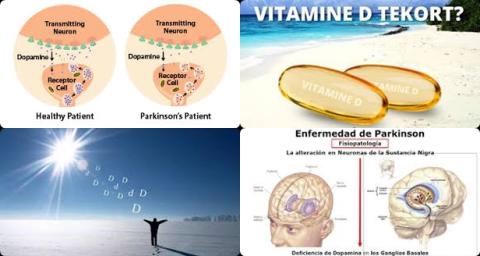
Objectives:
Is there an association between vitamin D and Parkinson's disease risk?
Study design:
This review article included 8 studies.
Results and conclusions:
The investigators found when compared with normal controls, 25-hydroxyvitamin D insufficiency (30 ng/mL) significantly increased risk of Parkinson's disease with 77% [OR = 1.77, 95% CI = 1.29 to 2.43, p 0.001].
The investigators found when compared with normal controls, 25-hydroxyvitamin D deficiency (20 ng/mL) significantly increased risk of Parkinson's disease with 155% [OR = 2.55, 95% CI = 1.98 to 3.27, p 0.001].
The investigators found 15 minutes/week sunlight exposure significantly decreased risk of Parkinson's disease with 98% [OR = 0.02, 95% CI = 0.00 to 0.10, p 0.001].
The investigators found the use of vitamin D supplements was effective in increasing 25-hydroxyvitamin D levels [SMD = 1.79, 95% CI = 1.40 to 2.18, p 0.001], but had no significant effect on motor function [MD = -1.82, 95% CI = -5.10 to 1.45, p = 0.275] in patients with Parkinson's disease.
The investigators concluded that insufficiency and deficiency of 25-hydroxyvitamin D (vitamin D in blood) and reduced exposure to sunlight increase risk of Parkinson's disease. However, vitamin D supplements show no significant benefits in improving motor function for patients with Parkinson's disease.
Original title:
The Association Between Vitamin D Status, Vitamin D Supplementation, Sunlight Exposure, and Parkinson's Disease: A Systematic Review and Meta-Analysis by Zhou Z, Zhou R, [...], Li K.
Link:
https://www.ncbi.nlm.nih.gov/pubmed/30672512
Additional information of El Mondo:
Find here more information/studies about vitamin D and chronic diseases.